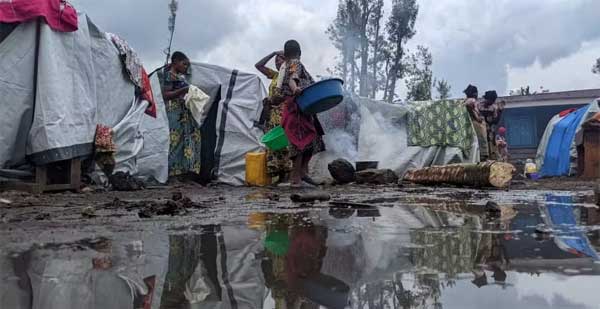The early 20th century was a tumultuous period marked by both widespread conflicts and the enduring legacy of colonialism. As nations grappled with the socio-political consequences of imperial rule, the shadows of colonial powers loomed large in various conflicts around the globe. This article delves into the intricacies of how colonialism shaped the geopolitical landscape, fueled nationalist movements, and led to economic exploitation that sowed the seeds of instability. By examining specific case studies, we can better understand the implications of colonialism and its lasting impact on modern warfare.
Unpacking Colonialism’s Legacy in 20th Century Conflicts
Colonialism has left a profound and often painful legacy that continues to influence conflicts well into the 20th century. The imposition of foreign powers disrupted indigenous cultures, economies, and political structures, leading to a systemic disenfranchisement of colonized societies. As European nations expanded their empires, many traditional governance systems were dismantled or co-opted, resulting in a significant power vacuum that would later contribute to conflicts. The legacies of land dispossession, cultural erasure, and social stratification established deep-rooted grievances that would not easily fade.
Furthermore, the arbitrary borders drawn by colonial powers often ignored ethnic and cultural boundaries, laying the groundwork for future ethnic tensions and conflicts. In regions such as Africa and the Middle East, these borders have frequently resulted in multi-ethnic states with competing national identities, creating a tinderbox for civil strife. Consequently, the colonial legacy not only shaped immediate conflicts but also established patterns of violence and resistance that would manifest in various forms throughout the 20th century.
The psychological scars of colonialism also contributed to a complex interplay of identity and belonging among colonized peoples. With the imposition of foreign cultures, native populations often experienced a crisis of identity, leading to movements that sought to reclaim lost heritage and autonomy. This internal conflict further exacerbated tensions, as indigenous groups found themselves caught between the desire for independence and the realities imposed by colonial rule.
Colonialism and Early 20th Century Conflicts
| Conflict/Region | Colonial Influence | Outcome/Impact |
|---|---|---|
| World War I | Colonies provided soldiers and resources | Strengthened independence movements |
| Indian Independence | British economic policies led to mass protests | Led to eventual independence in 1947 |
| African Revolts | Harsh colonial rule triggered uprisings | Increased resistance to imperialism |
The dissolution of empires following World War I and II opened new avenues for nationalistic fervor, as former colonies sought autonomy. However, the legacy of colonialism meant that the transition to independence was often fraught with conflict. Power struggles emerged not only between colonizers and the colonized but also among various factions within newly independent states. The struggle for national identity became a battleground in itself, often resulting in violent upheaval.
Moreover, the ideological frameworks that emerged during the 20th century—such as Marxism and anti-imperialism—were heavily influenced by the colonial experience. The rise of revolutionary movements can often be traced back to a response against colonial oppression, as leaders sought to mobilize the masses against both colonial and post-colonial authorities. These movements, while sometimes resulting in significant change, also led to cycles of violence that persisted for decades.
In sum, the legacy of colonialism in the early 20th century is a multifaceted phenomenon that established numerous conflicts and dynamics. The historical context of colonialism not only shaped the nature of these conflicts but also influenced the sociopolitical landscapes in which they occurred, making it an essential aspect of understanding early 20th-century warfare.
The Geopolitical Landscape: Colonial Powers and Their Ambitions
The early 20th century was characterized by the ambitions of colonial powers, particularly in Europe, where nations sought to expand their empires at any cost. The competition for resources, markets, and strategic territories fueled rivalries and conflicts that would climax in the two World Wars. Colonialism was often justified by a sense of superiority; the belief in the civilizing mission drove countries like Britain, France, and Germany to exert control over vast territories in Africa, Asia, and the Pacific.
The 19th century had set a precedent for imperial expansion, with the Berlin Conference of 1884-1885 carving up Africa among European powers. This geopolitical maneuvering not only intensified competition but also created a framework that dictated how nations interacted. The ideologies of nationalism and imperialism became intertwined, with countries positioning themselves as leaders of civilization, often disregarding the rights and needs of indigenous populations.

As tensions escalated, the geopolitical ramifications of colonial ambitions became increasingly evident. The competition for colonies led to alliances that would eventually contribute to the outbreak of World War I. For instance, the assassination of Archduke Franz Ferdinand in 1914 set off a chain reaction of alliances formed during the scramble for colonies, illustrating how colonialism and global politics were inextricably linked.
In Asia, the decline of traditional empires, such as the Ottomans, created a power vacuum exploited by colonial interests. The British Empire’s hold over India and the emergence of Japan as an imperial power reflected the shifting dynamics in global politics. Colonialism altered the balance of power, often pitting one colonial authority against another, further complicating international relations and sowing the seeds for future conflicts.
The geopolitical landscape also saw the rise of anti-colonial movements as colonized nations sought to assert their sovereignty. The struggle for independence became a global phenomenon, with colonies rallying against the imperial powers that had controlled them for generations. This push for self-determination would reshape international politics and lead to the decline of traditional colonial empires.
In this ever-evolving geopolitical landscape, the ambitions of colonial powers had far-reaching consequences. The competition for dominance not only influenced conflicts during the early 20th century but also laid the groundwork for contemporary international relations, marked by lingering tensions rooted in historical colonial legacies.
Nationalism and Resistance: Responses to Colonial Rule
The response to colonial rule was not a singular narrative but a complex tapestry of nationalism and resistance that unfolded across the globe. Nationalistic movements emerged as a powerful counterforce to the imposition of foreign rule, galvanizing diverse groups within colonized societies. These movements often drew upon shared cultural identities and historical experiences as a means of fostering unity against colonial oppression.
In many countries, the struggle for independence was characterized by the formation of nationalist parties and organizations. These entities served as platforms for political mobilization, articulating the grievances of the colonized and demanding autonomy. Leaders such as Mahatma Gandhi in India and Kwame Nkrumah in Ghana emerged as influential figures who championed the cause of independence, advocating for both political and social reforms.
Resistance to colonial rule also took various forms, ranging from peaceful protests to armed insurrections. The spectrum of responses highlighted the diversity of experiences and ideologies within colonized societies. While some embraced nonviolent approaches, others resorted to armed struggle, often fueled by a desire to reclaim land, resources, and cultural identity. This duality of resistance strategies illustrated the complexities of anti-colonial sentiments.
The rise of nationalist movements was often met with brutal suppression by colonial authorities, leading to a cycle of violence and retribution. In places like Algeria and Vietnam, colonial powers employed extreme measures to maintain control, which only intensified the resolve of nationalists. The violent responses from colonial regimes galvanized support for independence movements, as acts of repression became rallying points for collective action.
As the 20th century progressed, the rhetoric of nationalism evolved, intertwining with global ideologies such as socialism and communism. These ideologies resonated in many anti-colonial movements, as leaders sought to address not only the political but also the economic injustices perpetuated by colonial rule. The fusion of nationalism with broader ideological movements enriched the anti-colonial landscape, creating a formidable challenge to colonial powers.
In summary, nationalism and resistance played a crucial role in shaping the dynamics of early 20th-century conflicts. The myriad responses to colonial rule reflected the complexities of identity, culture, and power, making the struggle for independence a multifaceted endeavor. The legacy of these movements continues to influence contemporary discussions on sovereignty, identity, and self-determination.
Economic Exploitation: Fueling Tensions and Instability
Economic exploitation was a cornerstone of colonial rule, and its impacts reverberated through the conflicts of the early 20th century. Colonial powers systematically extracted resources from colonized territories, prioritizing the economic interests of the empire over the well-being of indigenous populations. This relentless pursuit of profit not only impoverished the colonized but also created significant economic disparities that would later fuel tensions.
The exploitation of natural resources—such as minerals, agricultural products, and labor—became a hallmark of colonial economies. Colonial powers established systems of extraction that prioritized export over local development, leaving many regions economically dependent and vulnerable. The consequences of this exploitation became increasingly apparent as colonized nations sought to break free from foreign domination, leading to widespread protests and revolts.
In agricultural regions, colonial policies often disrupted traditional farming practices. Cash crops were prioritized over subsistence farming, leading to food insecurity and social unrest. The shift in economic focus created tensions between local communities and colonial authorities, as farmers struggled to adapt to new demands that undermined their livelihoods. The economic exploitation perpetuated cycles of poverty and discontent that fueled resistance against colonial rule.
Moreover, the consequences of economic exploitation were not confined to the colonies themselves; they had global repercussions. The disparities created by colonial economic practices contributed to tensions between countries, as newly independent states sought to renegotiate their roles in the global economy. The struggle for equitable trade agreements and resource rights became central to many post-colonial movements, complicating international relations.
The impact of economic exploitation was also reflected in the emergence of class divisions within colonized societies. Wealth generated through colonial enterprises often benefited a small elite, while the majority remained marginalized. This inequality bred resentment, leading to social tensions that further complicated the struggle for independence. The legacy of economic exploitation, therefore, was not just a matter of resource extraction but also of social stratification.






This article does a great job explaining the economic aspects of colonialism. It’s sad to see how exploitation created lasting inequalities.
‘Psychological scars’ from colonialism is an important point. It’s crucial to recognize the emotional impact on communities.
I never realized how colonial borders caused so much trouble later. It’s a good reminder of how history shapes our world today.
‘Resistance movements’ show that people always find ways to fight back against oppression, which is inspiring and powerful.
I found the case studies really helpful in understanding these complex issues. It shows how deep-rooted these problems are.
This article explains how colonialism affected many countries. It’s interesting to see the links between past and present conflicts.
‘Economic exploitation’ seems to be a recurring theme in history. We should learn from these past mistakes for future progress.
‘Multi-ethnic states’ can create challenges, and this article highlights how important it is to consider local cultures when drawing borders.
The discussion about nationalism is fascinating. So many people fought for their independence, but it came with a lot of violence too.
The impact of colonialism is still felt today, especially in terms of identity and culture. It makes you think about what was lost.